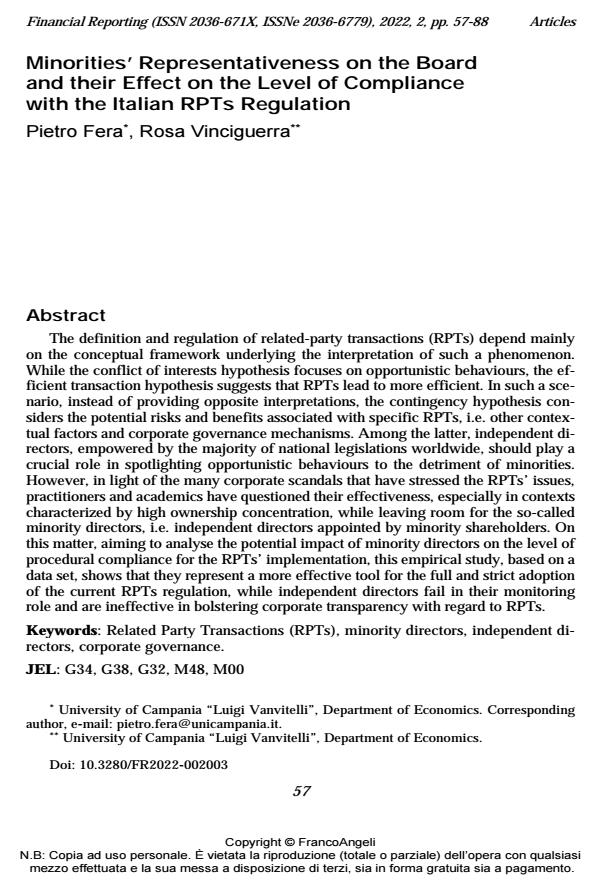Minorities’ Representativeness on the Board and their Effect on the Level of Compliance with the Italian RPTs Regulation
Journal title FINANCIAL REPORTING
Author/s Pietro Fera, Rosa Vinciguerra
Publishing Year 2022 Issue 2022/2
Language English Pages 32 P. 57-88 File size 259 KB
DOI 10.3280/FR2022-002003
DOI is like a bar code for intellectual property: to have more infomation
click here
Below, you can see the article first page
If you want to buy this article in PDF format, you can do it, following the instructions to buy download credits

FrancoAngeli is member of Publishers International Linking Association, Inc (PILA), a not-for-profit association which run the CrossRef service enabling links to and from online scholarly content.
The definition and regulation of related-party transactions (RPTs) depend mainly on the conceptual framework underlying the interpretation of such a phenomenon. While the conflict of interests hypothesis focuses on opportunistic behaviours, the efficient transaction hypothesis suggests that RPTs lead to more efficient. In such a scenario, instead of providing opposite interpretations, the contingency hypothesis considers the potential risks and benefits associated with specific RPTs, i.e. other contex- tual factors and corporate governance mechanisms. Among the latter, independent di- rectors, empowered by the majority of national legislations worldwide, should play a crucial role in spotlighting opportunistic behaviours to the detriment of minorities. However, in light of the many corporate scandals that have stressed the RPTs’ issues, practitioners and academics have questioned their effectiveness, especially in contexts characterized by high ownership concentration, while leaving room for the so-called minority directors, i.e. independent directors appointed by minority shareholders. On this matter, aiming to analyse the potential impact of minority directors on the level of procedural compliance for the RPTs’ implementation, this empirical study, based on a data set, shows that they represent a more effective tool for the full and strict adoption of the current RPTs regulation, while independent directors fail in their monitoring role and are ineffective in bolstering corporate transparency with regard to RPTs.
Keywords: Related Party Transactions (RPTs), minority directors, independent di- rectors, corporate governance.
Jel codes: G34, G38, G32, M48, M00
- Independent minority directors against self-serving and manipulative practices in non- financial reporting F. Cappellieri, R. Vinciguerra, A. Ricciardi, M. Pizzo, in Journal of Management and Governance /2025 pp.453
DOI: 10.1007/s10997-024-09722-y - Minority Directors and Firm Sustainability Performance Pietro Fera, Paolo Fiorillo, Giorgio Ricciardi, Luana Serino, in SSRN Electronic Journal /2025
DOI: 10.2139/ssrn.5118813 - Minority Directors and Firm Sustainability Performance Pietro Fera, Paolo Fiorillo, Giorgio Ricciardi, Luana Serino, in Journal of International Financial Management & Accounting /2025 pp.598
DOI: 10.1111/jifm.12240 - Minority directors: A review of determinants and consequences and suggestions for future research Pietro Fera, Gianmarco Salzillo, Caterina Cantone, in Corporate Board: Role, Duties and Composition /2022 pp.8
DOI: 10.22495/cbv18i3art1
Pietro Fera, Rosa Vinciguerra, Minorities’ Representativeness on the Board and their Effect on the Level of Compliance with the Italian RPTs Regulation in "FINANCIAL REPORTING" 2/2022, pp 57-88, DOI: 10.3280/FR2022-002003